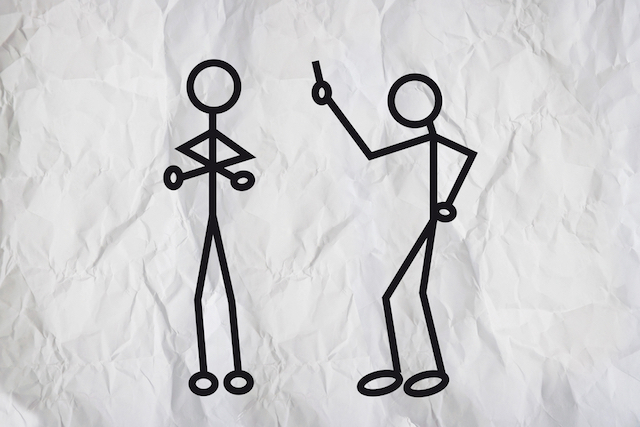
“Concern yourself not with what is right and what is wrong but with what is important.” ~Unknown
I remember quite distinctly the point where my rational self, less invested in the discussion, took a step back and pointed out that I was descending down the path of needing to prove that I was right.
It was precisely when I started seeing the other commenter as needling my position and attacking the ideas as mine.
What started out as an appeal to respect cultures that celebrate death as a normal part of life, turned into a mud-slinging event the moment I ceased to educate and instead went down the road of righteous anger.
Even if we were to keep our social network to the closest friends and family members, there will inevitably come the time when, as we scroll through our Facebook feed, we encounter something that we disagree with.
If we are not careful about the way we react or respond to these kinds of things, drama will arise.
And oh, such drama it was! Despite not participating any further once some ganging up occurred and outright insults were being flung, I came away from the debacle more furious with myself than anyone else.
In hindsight, it really was hilarious the way it quickly descended into a playground squabble where the crux of the matter was “I’m right, you’re wrong!”
But unlike childhood fights where it is rare that full-blown grudges develop (notice how children make up and play together easily?), the issues that adults tend to have petty fights over are a bit more complicated, simply because we are way more invested in it.
It isn’t over a fire truck belonging to us that can be easily shared with another child. It is occasionally belief systems and ideologies that we think define us, and so we do not take too easily to them being challenged.
I later received a long message from the other person that was essentially an attempt at civility after the earlier descent into childishness. But while the absence of trolling was a nice welcome, here too was another invitation to engage further in another bout of drama.
Ignoring the comments about my character and only clarifying issues I felt were relevant to the earlier discussion, I refused to bite.
What I’m slowly learning, and I am quite a slow learner when it comes to social interactions, is that personal affronts are key to the development of drama, and how we choose to respond to what the other person doles out will determine our state of being.
This isn’t something solely confined to social media interactions, either; Facebook, Twitter, and other sites like them are all just platforms where our interactions take place. Unnecessary drama and squabbles did not appear after the Internet but are simply magnified by it.
If you decide earlier on that personal attacks will not hurt you and that you will not yourself fling insults, you’ll be much more likely to have a discussion that’s conducive for education and sharing of ideas.
These attacks often come out innocuously enough. An adept practitioner of shade can fling one at you with much subtlety, so control is necessary in ensuring that you are always on the right road.
Unfortunately, I have yet to be gracious enough to not throw shade myself, and thus the initial eruption of drama stemmed from my lack of control. We cannot control will perceive or retaliate with, but we can choose how we respond to them.
The moment we choose to take the issues personally, we cease to participate in civil discourse as we insist upon the particular details that we feel attack our characters.
We feel the need to yell that we are right rather than strive to seek and communicate truth.
With that said, I am certainly not excusing those who choose to create conflict rather than communicate peacefully. Once you see things heading down that awful road, it’s best to simply disengage and leave because nothing fruitful will come out of it.
What matters at this point, I feel, is how you resolve your position, and it isn’t about how you appear to other people who may be watching (or reading the thread), but how you now feel about your beliefs and ideas.
Are ad hominem attacks ever conducive to the truth? The moment we associate ego and pride with our various ideologies, we miss the mark.
In a world of multivariate opinions, beliefs, and philosophies, friction is bound to occur when these ideas inevitably collide.
There are certain fields more volatile than others, like politics and religion, and they require careful treading. When in the thick of drama, especially with drama-hungry spectators egging us on, we lose the point and indulge, instead, in a battle of wits over who can yell the loudest in being right.
To keep drama at bay, it is necessary to maintain that, while ideas form much of what we think we are, they are merely constructs that only help us make sense of life and do not essentially form who we are.
If someone attacks what we believe, they’re not attacking us. They’re disagreeing with our opinion because they hold a different point of view. And if they choose to attack us personally, it’s likely not about us, but rather reflective of their fear-based attachment to their beliefs.
It is perhaps worth bearing this in mind whenever we feel the urge to take something personally.













 Though I run this site, it is not mine. It's ours. It's not about me. It's about us. Your stories and your wisdom are just as meaningful as mine.
Though I run this site, it is not mine. It's ours. It's not about me. It's about us. Your stories and your wisdom are just as meaningful as mine.
Anonymity allows people to have a more “edgy personality”, if you like, over the internet. Even in platforms like facebook most of the heated discussions take place among people with whom we do not share close connections. Its easy to abuse a person knowing that it won’t have any negative impact socially or professionally.
I am still affected by such comments and as a result suffer due to them. No doubt ego has a lot to do with this. You rightly pointed out that there is a difference between a child and an adult squabble. Adults imo are more attached to their self image and anything they perceive as an attempt to malign their “self” can make them very defensive, produce outburst of anger and worst result in forming deep rooted grudges.
I think it is important to manage our internet environment to a certain extent. We dont need to read every comment in every article. Often reading an article we get an idea of what kind of comments we are supposed to get in there. It is not always necessary to read or react to everything we come across on the internet. And like you suggested, I think its important to be able see ideas and beliefs as separate from ourselves, as constructs, and not as some permanent or defining feature of ourselves.
There is a positive side in this challenge too. The manner in which we react to strangers, our upvotes/ downvotes etc, is a clue to our character. Internet, including the internet trolls actually provide us the opportunity to look at ourselves, our belief systems, our emotional balance and our personality in general. If we can maintain our balance, be genuine and yet nice with people with whom we have no family/ professional or social interest we are surely improving ourselves and even the society.
This is great advice for any actor or film maker who is trying to get a project done. You have to check your ego at the door and do what is best.
This is very true but once you have identified & recognize where you are heading how do you get away from a Tsunami of emotional drama people? Do you just smile & walk away? These people feed on negative respond or just ignoring them. They are on a look out for a grain of sand to create volcano. I find it natural to let things slide. I don’t do this deliberately or to gain Browne points …. this is who I am. I don’t feel i need to be constantly apologize for my action for not responding to controlling people. This can become a sour point and angers her. To the point she starts screaming and cussing & says I need to see a shrink. She has estranged her family. Hates her parents, hates her siblings and hates her nephews & nieces & grandparents.
Do I stick around & help my friend or do I smile & walk away.
Very good point. I recently experienced something along these lines and I was mindful of the comments I made even though the other party chose to sling mud. I walked away from the discussion knowing that I had made my point but, more importantly, that I had done it in such a way that I had no reason to feel embarrassed or ashamed. I could come back years later and defend everything I said with dignity and composure. Great Post!!
great article, so much needed both in real life and social media one. My favorite idea was this one: “To keep drama at bay, it is necessary to maintain that while ideas form much of what we think we are, they are merely constructs that only help us make sense of life and do not essentially form who we are.” Thank you – morning coffee reading – well spent 🙂
This is one of my favorite T.B. posts yet…. Thanks!
I liked the article so much that this part didn’t even leap out to me; thanks for highlighting it to me!
Great
You are right about not “fighting back” when someone on line or someone you don’t know attacks your opinion. What I find is worse is when a friend, who knows you well, uses your vulnerabilities as a way to attack you. This happened to me and thankfully, I didn’t blow at her. I stated the truth again and she got tangled in her own twisted lie. I honestly didn’t realize that I led her innocently to admitting the truth. It just happened. Then I excused myself and have never spoken to her again. What I have discovered is that if you see someone doing this to their other friends or relatives, drop that person immediately as a friend because one day they will do it to you. It hurts but life is too short to be attacked by someone you’ve spent years trying to understand.